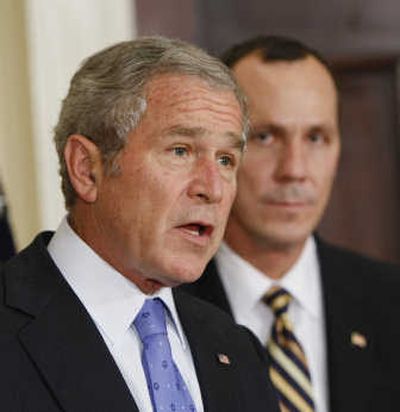Bush acts to ease holiday aviation woes

WASHINGTON – With Thanksgiving and peak holiday travel approaching, President Bush announced several steps Thursday aimed at alleviating “the epidemic of aviation delays.”
The Pentagon, for its part, is opening “Thanksgiving Express Lanes,” freeing some of the military’s dedicated airspace to commercial airlines along the Eastern seaboard for five days surrounding the Thanksgiving holiday. Meanwhile, airlines have promised to make more workers available for passenger check-ins, baggage handling and relief for bumped passengers, as well as additional ticket-dispensing kiosks.
The president’s action on aviation comes at a time of increasing congestion at the nation’s biggest airports – particularly in the New York metropolitan area – which has caused nationwide flight delays and cancellations and baggage losses. Domestic airlines expect to fly 27 million people worldwide during the holiday period starting today – a 4 percent increase over last year, with planes averaging 90 percent capacity.
“We can restore the confidence of America’s consumers, improve the efficiency of America’s airports and bring order to America’s skies,” Bush said, using a White House podium to promise answers for “the epidemic of aviation delays. … It’s one thing to analyze the problem, but the American people expect us to come up with some solutions.”
Many aviation experts immediately blasted the Bush administration’s holiday travel measures as a last-ditch effort to prevent chaos in the coming days, and they said it shows how politicized airline flight delays have become in the worst year to fly since airline over-scheduling caused the near-meltdown of the airline industry in 2000.
The experts said the White House’s strategy represents a mixture of old initiatives to simply urge the airlines – without any threat of enforcement – to make sure ticket counters, aircraft and baggage sorting rooms are adequately staffed this holiday season.
“This is President Bush saying, ‘Let me get out there just days before Thanksgiving and make it look like I’m doing something,’ ” said Joe Brancatelli, a travel columnist who focuses on how the airlines run their businesses and treat their customers.
He dismissed the Federal Aviation Administration’s announcement Thursday that it will help head off flight delays by imposing a special holiday moratorium on most airport maintenance projects, saying it is a standard procedure that should be done anyway just like highway departments routinely shut down road construction over holidays.
Likewise, the administration’s promise Thursday to double the compensation that airlines would have to pay passengers who are bumped from overbooked flights, starting next summer, will do nothing to address flight delays and airport congestion – either over Thanksgiving, Christmas, next summer or any time.
The president announced several federal actions aimed initially at easing travel during the Thanksgiving holiday. Aside from opening the reserved military airspace from Maine to Florida, there will be a “holiday moratorium on all non-essential work” at the Federal Aviation Administration, so all its personnel and equipment can be used to keep flights on time and reduce bottlenecks in New York and Newark in particular.
And Bush said that, at the government’s urging, airlines have agreed to make more staff available to facilitate check-ins and boarding at airports and to help accommodate people whose flights are delayed or canceled – as well as adding more ticket kiosks for self check-ins.
With an eye toward improving air traffic in the long run, the president proposed new federal regulations to ensure that passengers are “treated fairly.” This includes a proposed doubling of compensation for passengers bumped from overbooked flights – raising it from $400 to $800 for passengers whose travel is delayed by more than two hours.
And it includes “congestion pricing” for the airlines, such as increased airport fees at peak hours and auctioning of rights to “the highest-value flights,” to encourage carriers to spread flights over more hours. The FAA has opened a Web site – www.fly.faa.gov – enabling travelers to check travel delay times at the nation’s airports.
FAA officials acknowledged that the real solutions to congestion at airports and in the skies are still years away, when air traffic control transitions from the existing ground-based radars to a satellite system that helps pilots circumvent congestion and choose the most direct routes. But the Bush administration and Congress are deadlocked over how much to invest in modernizing the nation’s aviation system and how to split the bill between government and the private sector.